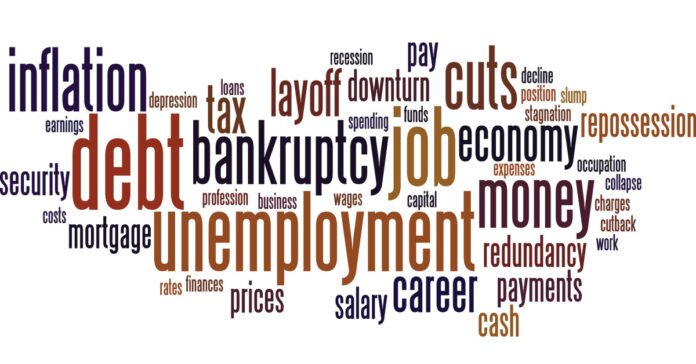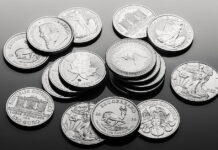In mid-July, I wrote. “It’s looking more and more like the U.S. will not face a recession this year, which means we will see more inflation.”
In hindsight, I think I was half wrong. Yes, we are already seeing inflation increase, but we may well see a recession in the fourth quarter. Of course, we won’t know if it is officially until months afterwards, but we’ll feel in our wallets, on the jobs front, and in housing prices. We’ll see it in the dwindling number of full-time jobs available and the growing number of cars that get repossessed. You might see it at your home or a neighbor’s when an adult kid move back home or they rent out a room to help pay expenses. You’ll see it in a smaller turkey and fewer side dishes at Thanksgiving and a lack of presents under the Christmas tree.
Some people are already experiencing the symptoms of a recession. Credit card debt, for example, has reached new highs, surpassing a trillion dollars. Why? Because people are spending more to preserve their standard of living.
The average interest rate on credit cards is a whopping 20.93 percent. That means the annual interest total is $209 billion. That’s money going to pay interest instead of buying groceries. By building up debt, you are digging a deeper hole.
Here’s a piece of advice that will do you will in many aspects of your life: When you find yourself in a hole, stop digging. (This applies to everything from an argument with your spouse, losing money on sports betting, or spending more on your credit card than you can pay off.) For some, the challenge is recognizing when you are in a hole.
Debt and Deficit
Of course, the U.S. government has a different perspective. They want to spend themselves out of a recession, which means when they find themselves sin a hole, they dig faster. To which I say, don’t confuse activity with productivity.
Experts predict the annual federal deficit will double to $2 trillion this year, which will bring the total debt to $33 trillion. That’s about $100,000 per person in the U.S. (Imagine if the government was like a condo board and hit you with a special assessment of $100,000 for you and each of your dependents. Would you be able to pay that much? Do you think your inability to do so that will stop them? No, they will find other ways to squeeze blood out of a stone.)
There are three big reasons the U.S. deficit is growing:
- The government spends more than it makes. Mot of this is so-called “mandatory” programs rather than discretionary. Social security, for example, makes up 20 percent of the budget.
- Tax receipts have dropped by about 13 percent year-to-date because Biden has offered so many green energy tax credits. Even though he raised taxes, the government is collecting less money, especially from big corporations.
- The rate the U.S. pays on its debt has increased, just like it the interest rate on consumer loans and mortgages has jumped. As a result, far more tax income is being used to pay interest (often to foreign lenders, including China) rather than fund government programs.
This shows two things: BIdenomics is not working, and the government is paying a price for rising inflation because it drives up interest rates. Of course, no one in the Biden administration is skipping meals to save money because they are nursing at the public teat.
According to USA Today, 59 percent of Americans and 76 percent of independents say the economy has grown worse under Biden.
The Downward Spiral
Two years ago on Sept. 6, 2021, I wrote about the downward spiral. A good bit of that post remains valid today, so I am reprinting most of it below.
Think of the death spiral as the deadly black hole your ship of state must orbit. When the ship enters the orbit, the black star is at a great distance and the gravitational pull is so light it barely registers. In each successive orbit, the ship is pulled slightly closer, but it happens so slowly, no one notices. Bridge crews change. The captain retires. The changes are so incremental that they are dismissed as little more than rounding errors. A few old men express concerns, but they are easily ignored. After all, things don’t seem that bad.
Suddenly, the ship has to swing out of its normal path to avoid colliding with a foreign object. Only when it tries to return to its former path does the pull of the black hole seem so inexorable. Can the ship escape? Yes, but only at great expenditure of fuel and other resources. Is it worth it, the leadership team wonders? It would be easier to maintain their current orbit. They can do so for years, and they won’t be around to take the blame. They decide to let the next captain and crew worry about it. Thus, the can is kicked down the road.
We Begin to Fool Ourselves
As that day gets closer, so does the debris around the black star. Each time the crew takes corrective action, the net result pushes the ship of state further down the death spiral. Crashing into the black hole now seems inevitable. The ship’s crew embarks on a campaign to convince the citizens that getting sucked into the black hole is not the end. New, modern theories are developed that match the desired outcome instead of the actual outcome. They use “experts” and “science” to “prove” that the black hole is actually a doorway to another universe. Saner voices who argue otherwise are silenced. The old rules do not apply, the passengers are told. Everything will be OK if you just do what the captain and crew tell you.
At some point, much of the crew and passengers are convinced. The younger members have never even heard the old fears because teaching them is prohibited. After all, why not believe? By now, the gravity well is inescapable. Nothing can save the ship. It has reached the point on the death spiral where the end is nigh and all the passengers can do is hang on and hope. Far better to go down drinking the last of the Champaign than to whip up a great deal of useless finger pointing accompanied by wailing and gnashing of teeth.
Only as the ship breaks apart under them, only as the gravitational pull tears pieces of the hull off, admitting the killing vacuum, does one of the old men point an accusing finger at the captain and yell, “I told you so!”
A Glimmer of Hope
The only glimmer of hope I see is that countries have fallen before. Reserve currencies of the world have come and gone in the past. Inflation is not new. We still have vast mineral and energy resources, and a stockpile of weapons that should prevent us from being invaded by a foreign power. Yes, we will fall. We will hit hard. There will be a great disruption and we will be damaged and weakened, but we will not be destroyed.
Our job, as preppers, is to be a lifeboat when the gravitational forces pull the country apart. Our job is to survive the mass die off that a collapse will create and when it is over to help provide a path forward. Some would even argue that we should use the chaos and disruption to clean house, to set things right, to get back to a firmer constitutional foundation. That may be the case, but for now, focus on surviving.
Have the resources you can live on when the store shelves are empty, the trucks are no longer running, and our trading partners refuse to accept dollars. Ensure you have a place to go and a way to defend yourself in the vacuum that will exist when the rule of law is no more. Have a few silver coins tucked away, something that you can use for an emergency purchase when dollars are no good.
A Bumpy Ride
Be prepared for a bumpy ride and to face the unexpected. Be flexible enough to adapt and adjust to things as they are rather than as they were or as you wish them to be. Many will be caught by surprise, frozen in fear, and left helpless by the sudden change. You must be able to accept the great change and work within it rather than resisting it.
As anyone with a canoe or kayak can tell you, paddling downstream can be dangerous when you approach rapids, but it is far easier than paddling against the current. Be prepared to go with the flow and then pull over and assess your status when you reach still water.







